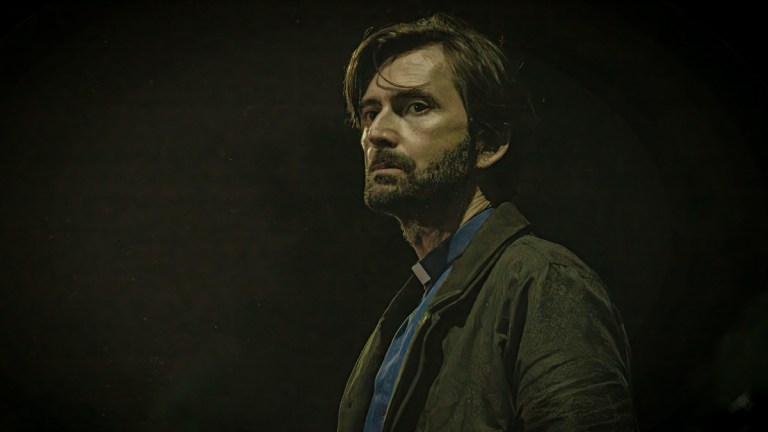Inside Man Ending: a Teasing Post-Credits Scene Leaves the Series 2 Door Open
Steven Moffat’s BBC-Netflix series concludes in a rush and makes sure to leave questions unanswered for a potential return. Finale spoilers ahead.

Warning: contains spoilers for the Inside Man finale
Like death row inmate Jefferson Grieff, Inside Man wants more life. That’s the only explanation for its post-credits scene, which added nothing but questions to an already unsatisfying story.
After the credits rolled on the fourth and final episode, lingering viewers saw Grieff (Stanley Tucci) and his companion/human recording device Dillon being led into the interview room of their US prison. There, they met Janice Fife, the British woman whose murder Grieff had averted a week earlier from across the Atlantic using a combination of his criminologist nous and his best guess (“Guessing is how reason proceeds in the absence of fact” is one of his Sherlock-ian slogans).
Janice Fife’s Husband
Janet (Dolly Wells) was in the US to bring the ‘death row detective’ a case. “You do understand that I’m a little pressed for time?” he asked, in reference to his looming execution date. “I understand you’ll be dead in a week,” Janice told him with equanimity.
After some chit-chat about their mutual acquaintance Beth Davenport, the journalist who brought Janice’s disappearance to Grieff’s notice in the first place, played by Lydia West, Janice defined her purpose. She was there for her husband’s murder; not to have Grieff to solve it, seeing as her husband is still alive, but for Grieff’s help in committing it because her husband deserves to be dead.
Words said, incidentally, in a room that we’ve already seen is fully kitted out with CCTV cameras monitored by prison security. How Janice might hope to get away with this murder after making such a declaration of intent on camera either makes a mockery of her intelligence, or ours. If there is a second series, it may well be revealed to be all part of a fiendishly clever plan that involves a lot of dialogue and characters explaining things rather than feeling or doing them.
Inside Man’s Unanswered Questions
For the time being, we can put that question, and the one about why – with time at a premium – Janice didn’t video call Grieff from the UK as we’d just seen him do with the recently incarcerated Harry Watling (David Tennant), in the pile of queries that also includes: why Harry and Mary Watling (Lyndsey Marshal) don’t appear to know about the existence of traceable IP addresses, browser search histories, mobile phone mast triangulation, automatic number plate recognition, DNA forensics or digital forensics that could comfortably trace the origin and journey of a thumb drive filled with images of child sexual abuse, for instance. Did they not watch Line of Duty?
Back to Grieff – who’s fond of Beth Davenport and Janice Fife and no doubt would have also been fond of Harry’s wife Mary because they’re all essentially the same fast-talking, gutsy brainbox character he is, who asks how he can help. Janice smiles, and it’s the end.
As this is the first we’ve heard of Janice’s husband, viewers may be tantalised at this point. When Harry and Mary’s son Ben asked Janice if she was married when both were suffering carbon monoxide poisoning in the vicarage cellar, she’d told him no. In an earlier episode, Grieff surmised that something painful must have happened to Janice in the past in order for her to avoid other people as determinedly as she does. This husband must be an ex- or estranged, and likely treated Janice very badly indeed for her to have ended up so isolated and mistrusting, and to think this man so morally lacking that he deserves death.
Moral desert was very much a theme of Inside Man. Vicar Harry made terrible choices that led him to terrible acts but believed right until the end that he was justified. His intent was good, even if it led him to coming a hair’s breadth away from bludgeoning a woman to death. Even at the end, Harry didn’t see himself as a bad man, just an unlucky one, which is perhaps how all bad men see themselves – trapped by an unfortunate series of events.
Jefferson Grieff’s Wife
How Jefferson Grieff sees himself and his unfortunate events (i.e. the brutal strangling and decapitation of his wife Rachel, and his imminent execution for the above) is another unanswered question. Stanley Tucci’s character left the series without revealing why he killed his wife, or what he’d done with her head. When he promised Rachel’s criminal kingpin father Gordon that he’d told him where the head was buried in exchange for strings being pulled to stay his execution, it was all a ruse to get Gordon’s goons to rescue Janice from the vicarage cellar where he’d correctly guessed she was being held.
Grieff teased that he might tell the truth about his wife to Harry – now another “inside man” having been arrested for kidnapping Janice, and a fellow widower following Mary’s sudden death-by-truck. In a potential second series, if Grieff is granted more time, perhaps the vicar would join his locked-up crime-solving team.
Who knows why Grieff killed Rachel? Perhaps she isn’t even dead and running around the UK in her new guise as “Morag” (Kate Dickie). Or perhaps she is dead and he’s exactly the murdering bastard he says he is. The real question is this: leaving aside its excellent cast and exhilarating pace, has Inside Man done enough for viewers to want to tune in again to find out?
Inside Man is available to stream in full on BBC iPlayer in the UK. It’s due to arrive on Netflix in the US and worldwide at a later date.
